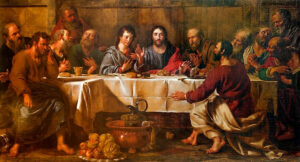Fr Neil’s homily on Maundy Thursday, 14 April 2022
For as often as you eat this bread and drink this chalice, you proclaim the Lord’s death until he comes.¹
Images depicting the Last Supper often portray an intimate scene: John resting against Our Lord with all the disciples gathered around him at table.
The hospitality of this shared meal is often lost on us who live in a culture of abundance. At the time of Christ, there was great honour in being an invited guest. The host honours the guests by inviting them to share in his most vital of resources: food.
Yet there is another layer to this meal as all are to participate in the shared story of God that defines the identity of a Jew in the Passover feast. Therefore this shared supper has a formal liturgical function that makes real the means of the covenant relationship of Israel with the God of their ancestors.
It is at this greatest feast of the people of God that Christ transforms and appropriates to himself the very central elements. He redefines them and states: ‘This is my body; this is my blood.’² Indeed Passover and all the cultic activity of the Temple are made complete in Christ. Everything else before was leading to this point, “today it is being fulfilled in your hearing.”³
Here Christ is establishing the New Covenant, leading to the new Israel in an exodus to the heavenly homeland. This is something that the earthly temple could only hint at.
In this upper room the dawn of the first light of the new heaven and earth are glimpsed. Christ reveals himself to be the real Paschal Lamb whose blood, to be shed on the Cross of Calvary, will protect those who hide underneath it from the power of sin and death.
Rather than bearing the law of God’s presence in the Ark in the temple sanctuary, the new Israel will carry his presence in the power of the Holy Spirit within their hearts and souls.
The true manna from Heaven that will strengthen God’s pilgrim people will be Christ; body and blood, soul and divinity, made manifest in the celebration of the Sacrifice of the Mass.
At this Last Supper the disciples are inaugurated as Apostles and it is upon these apostles, and their successors, that God has made the foundation of his heavenly kingdom.
The Last Supper constantly reminds us that the ordained ministry isn’t an old-fashioned medieval development but the very means by which God in Christ has chosen to administer his saving graces. It is a ministry marked by sacrifice and service to the Gospel and God’s people. It contains authority to teach, serve and administer the sacraments but not the grasping of power. It requires humility to the teachings of the Church and a heart of loving obedience to the Father.
There is much speculation about the lack of vocations in our western civilisation and I am sure there are a number of contributing factors. Yet the loss of belief that the ordained minster stands in Persona Christi, as the person of Christ, in the sacraments is not insignificant. With that loss of belief, the loss of the true sense of the holiness of God being in our midst at the eucharistic celebration are major contributing factors to the decline. Without ordained ministers there are no sacraments; and without the sacraments there is no Church and no means of salvation.
Tonight is the celebration of the dawn of our salvation that will lead us into the promise of the Easter joy. We gather together to hear and participate in the story of our salvation and with renewed vision, encounter Christ the living God who will embrace death to open the gates of heaven.
¹ 1 Corinthians 11:26
² Luke 22:19–20
³ Luke 4:21








 Posts
Posts